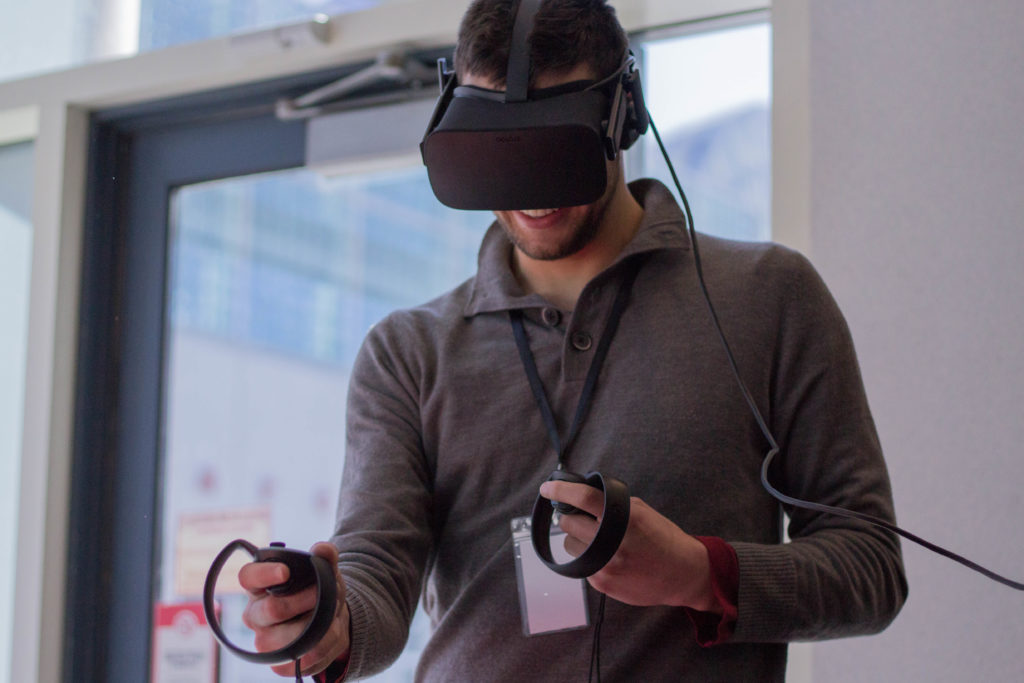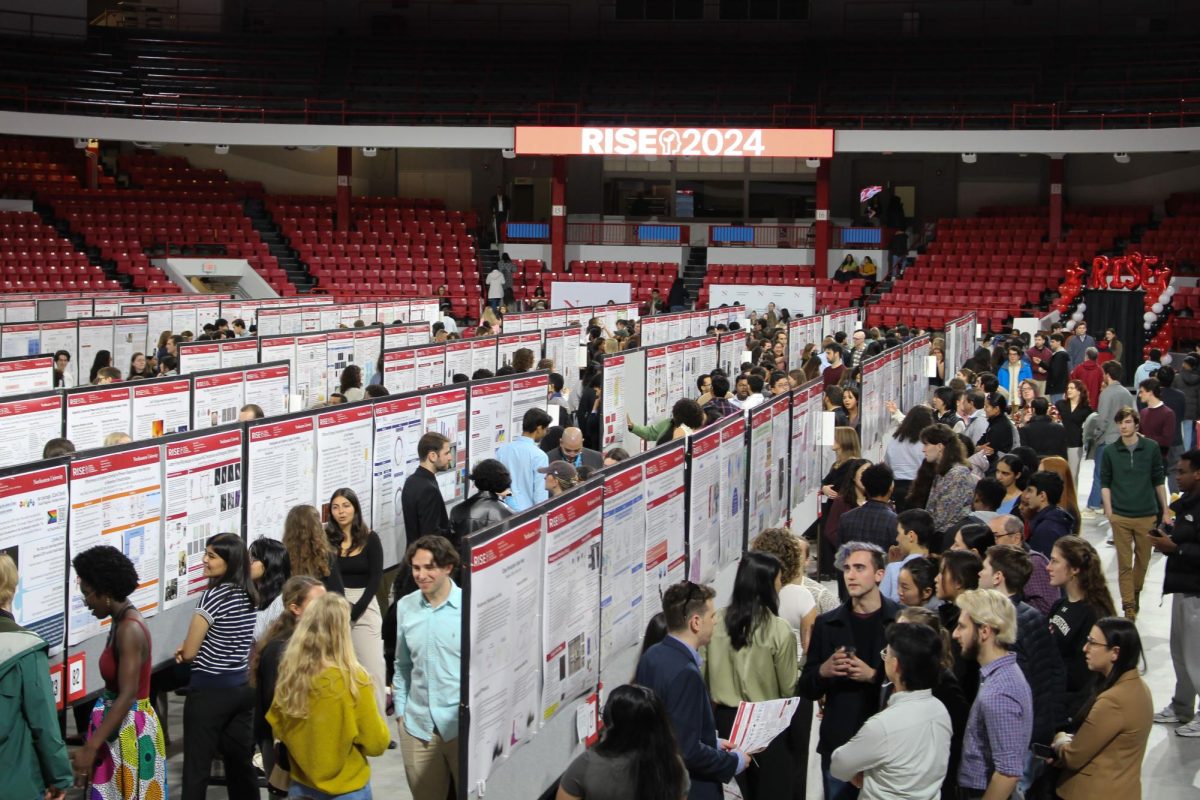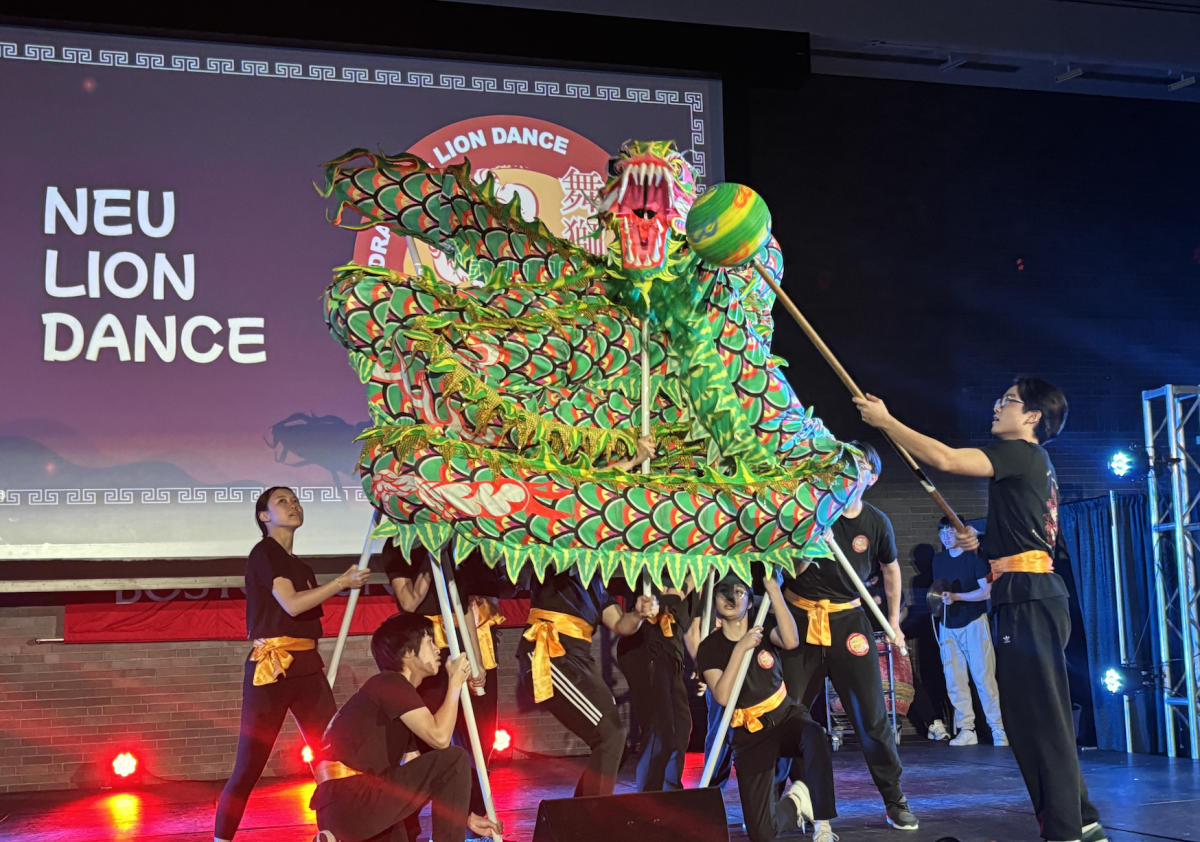By Morgan Lloyd, campus editor
Students, professors, alumni and Boston residents spoke on topics ranging from art history to regenerative biology during TEDxNortheasternU, held in the Raytheon Amphitheater March 18.
The event, with the theme “Wait, Why?”, was based around the idea of TEDx, a series of conferences showcasing local speakers. Several speakers set up expo-style stands demonstrating what they were working on. Exhibits included augmented reality glasses, a “brain control machine” and a live axolotl salamander.
The first speaker was Patrick Glover, a fourth-year behavioral neuroscience major, who talked about ways to make the neuroscience field accessible to more people.
“One in five of will come down with a neurological disorder at some point in our lives,” Glover said. “To have a hope of actually finding effective treatments or event cures for these diseases, we’re going to need more scientists.”
Glover worked with Backyard Brains, an organization that introduces children to neuroscience. He demonstrated one of the projects he brings to younger students: a “brain control machine” that links two people so that when one moves, the other does, too.
“Imagine you were 10 years old and you saw that,” Glover said. “Think of how excited you’d be.”
Chirag Kulkarni, a Northeastern alumnus, followed with a speech on the benefits of meditation in business. Kulkarni, who was one of Forbes’ top 25 marketing influencers to watch in 2017, credits meditation with helping him improve his skills as an entrepreneur.
“I came to realize the pause was where the progress in my business was coming from,” Kulkarni said. ”Not because I was just taking a step away from situations, but because I was taking a step away, developing this connection between the mind and the heart.”
James Monaghan, an assistant professor of behavioral neuroscience and biology at Northeastern, spoke on his research into regenerative biology. Monaghan studies axolotls, salamanders that are capable of regrowing lost limbs, as potential models for regenerative medicine in humans. As Monaghan explained, studying animals such as axolotls can provide clues for how to tap into the regenerative potential of our own cells.
The director of dining services at Northeastern, Maureen Timmons, delivered a speech titled “The Hidden Superpower of Food,” wherein she talked about using food as an educational tool. As an example, Timmons spoke about a Harvard class called “Science and Cooking: From Haute Cuisine to Soft Matter Science,” which used food to illustrate scientific principles.
“This course was created to illuminate the principles between physics, chemistry, biology and engineering,” Timmons said. “In the course, the chefs came in and they taught the culinary techniques, and then the professors came in and taught the related equations.”
Kritika Singh, a second-year bioengineering major, talked about her work doing malaria research and outreach. Singh is the founder of Malaria Free World, a non-profit organization dedicated to ending malaria worldwide.
“A child under the age of 5 dies every 60-90 seconds from malaria,” Singh said. “Since I started talking, three children have already died.”
In order to eradicate the disease, Singh said there needs to be more awareness of the magnitude of its effects.
“I ask you all to take a step back and look at the global picture. Look at our global community,” she said. “If something is affecting one part of it, it is really affecting all of us.”
Ory Zik is the founder of Greenometry, a company that collects data on climate change and carbon emissions. In his speech, Zik discussed the importance of understanding the numbers involved with carbon emissions. Through his research, Zik found that around 2 percent of students and faculty in U.S. universities could accurately estimate their carbon footprint.
“Many people and organizations would like to decrease their carbon footprint,” Zik said. “One thing that they have in common is that they don’t know how to count the very number that they want to reduce.”
Zik asked the audience to abide by the Paris Agreement, the international treaty regarding carbon emissions, to decrease their personal carbon footprint as well.
Dagmar Sternad, the director of Northeastern’s Action Lab, spoke about her research on the ways the body is optimized for motor skills. By asking people to perform computer simulations, one of which was demonstrated out front, Sternad was able to study how people learn to perform tasks involving motor skills.
Sternad emphasized that our skill at movement comes not only from our brains, but also in the ways our body is designed to optimize motor skills.
“We have ways that put into perspective not only how the brain controls the body, but how the body is harnessed by the brain,” Sternad said.
Art history was third-year computer engineering major James Doyle’s passion. However, as Doyle said, when works of art are destroyed, people should focus on the human cost of the destruction, not just the loss to the art world. As an example, Doyle cited the city of Palmyra, which held several ancient ruins destroyed by ISIS.
“Yes, there was the destruction of the Arch of Triumph. Yes, there was the destruction of the Temple of Bel,” Doyle said. “But alongside that was the destruction of people, of culture and of identities,”
Rebecca Love, the director of nurse innovation and entrepreneurship in the Northeastern School of Nursing, delivered the final speech of the event. Love emphasized that nurses, the end users of health care products, were being left out of the discussions of health innovation, leading to a more inefficient hospital system.
“Nurses are innovating in a highly inefficient health care system that is ripe for disruption, and the reason it continues to fail is that nurses have not been engaged in these decisions,” Love said.
Scott Breece, a fourth-year business administration major, helped organize the event, which was the first Northeastern TEDx event since 2014..
“The people who are here are interested, they’re motivated. I’ve seen people taking notes, I’ve seen what you said you were inspired by,” Breece said.
Correction: An earlier version of this story attributed the wrong grade to James Doyle. Doyle is a third-year computer engineering major.












